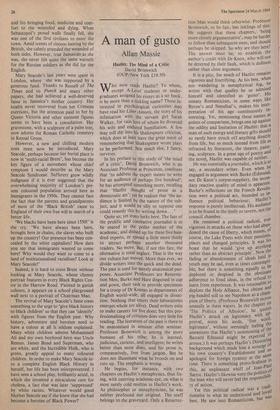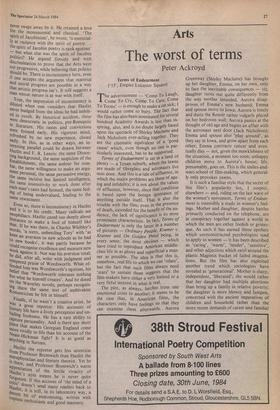A man of gusto
Allan Massie
Hazlitt: The Mind of a Critic David Bromwich (OUP/New York £19.50)
Who now reads Hazlitt? To whom, except A-Level students or under- graduates assigned his essays as a set book, is he more than a tinkling name? Those in- terested in psychological curiosities may have read his Liber Amoris, the story of his infatuation with the servant girl Sarah Walker, for vain love of whom he divorced his wife and endured humiliation. A few may still dip into his Shakespeare criticism, which does at least have the great merit of remembering that Shakespeare wrote plays to be performed. Not much else, I fancy, survives. In his preface to this study of 'the mind of a critic', David Bromwich, who is an Associate Professor at Princeton, confesses that `to address the expert means to write for an audience of perhaps five hundred'; he has attempted something more, recalling that `Hazlitt thought of prose as a democratic art'; yet he realises that 'the au- dience is limited by the nature of the sub- ject, and it would be silly to suppose one could remedy this by writing down ... ' Quite so; yet irony lurks here. The fate of the prolific and combative journalist is to be snared in the polite meshes of the academic, and dished up for these five hun- dred experts, or spread a little more thinly to attract perhaps another thousand readers. No more. But, if not this fate, the alternative is total neglect. That is the way our culture has moved. More than ever, we divide writers into the quick and the dead.
merely anatomical pur- The past is used for
poses. Associate Professors are Resurrec- tion Men, Burke and Hare disguised in cap and gown, their task to provide specimens for a troop of Dr Knoxes in departments of English world-wide, all engaged in dissec- tion. Nothing that enters their laboratories emerges whole (or alive). Dead writers exist to make careers for live dons; but this pro- fessionalising of criticism does very little for reading. The literature of the past is there to be anatomised in seminar after seminar. Professor Bromwich is among the more humane of his tribe; he is learned, judicious, curious, and intelligent; he writes better than most dons, and his prose is, comparatively, free from jargon. But he does not illuminate what he broods on and cuts up. The emphasis is wrong.
He begins, for instance, with two chapters on Hazlitt's metaphysics, thus fix- ing, with unerring academic eye, on what is most surely cold mutton in Hazlitt's work. As philosopher or metaphysician, he was neither profound nor original. The stuff belongs to the graveyard. Only a Resurrec- don Man would think otherwise. Professor Bromwich, to be fair, has inklings of this. He suggests that these chapters, 'being more closely argumentative', may be harder to follow than subsequent ones, and should perhaps be skipped. So why are they here? The answer must be, to establish the author's credit with Dr Knox, who will not be deterred by their fault, which is dullness rather than close argument. It is a pity, for much of Hazlitt remains vigorous and fructifying. At his best, when not wandering in metaphysical fog, he writes with that quality he so admired himself and identified as 'gusto'. His uneasy Romanticism, in some ways like Byron's and Stendhal's, makes his inter- pretation of his age continuously in- teresting. Yet, mentioning these names as points of comparison, brings one up against the oddity and limitation of Hazlitt: that a man of such energy and literary gifts should so rarely have struck off anything directly from life, but so much instead from
life as
refracted by literature, the theatre, paint- ing, sculpture. In a great age of poetry and the novel, Hazlitt was capable of neither. He was essentially a journalist, which is to say, a secondary writer. Even when he engaged in argument with Burke (Edmund, not Dr Knox's corpse-supplier), the secon- dary reactive quality of mind is apparent. Burke's reflections on the French Revolu- tion were a political act, intended to in- fluence political behaviour; Hazlitt's response is purely intellectual. His audience is to be found in the study or tavern, not the council chamber. He remained a political radical, ever vigorous in attacks on those who had aban- doned the cause of liberty, which meant, of course, the Lake Poets with their pensions, places and changed principles. It was his boast that he would 'give up anything rather than an abstract principle'. Now the fading or abandonment of ideals held in youth may be sad, even at times contempti- ble; but there is something equally to be deplored or despised in the obstinate adherence to fixed ideas, in the refusal to learn from experience. It was reasonable to deplore the Holy Alliance, but obtuse and pig-headed still to see Napoleon as a cham- pion of liberty. (Professor Bromwich moves uneasily in these waters. In the chapter on `The Politics of Allusion', he quotes Hazlitt's attack on legitimacy with ap- proval, notes his aside, 'fine word, legitimate', without seemingly feeling tile uneasiness that Hazlitt's summoning of the Bastard Edmund might be expected to arouse.) It was perhaps Hazlitt's Dissenting, background which made him a scourge 01 his own country's Establishment and an apologist for foreign tyranny at the same time. There is something proto-Stalinist in this, an unpleasant whiff of Jean-Pattl, Sartre. Hazlitt's likewise were the politics of the man who will never feel the responsibili-
ty of action.
Yet this political radical was a tradi,- tionalist in what he understood and loved best. He saw into Romanticism, but was
never swept away by it. He retained a love for the monumental and classical. 'The spirit of Jacobinism', he wrote, 'is essential- ly at variance with the spirit of poetry... the spirit of Jacobin poetry is rank egotism' — but what else was the spirit of Jacobin Politics? He argued fiercely and with discrimination to prove that the Arts were not progressive, while believing that politics should be. There is inconsistency here, even if one accepts the argument that material and moral progress are pOssible in a way that artistic progress isn't. It still suggests a man whose nature is at war with itself.
True, the impression of inconsistency is diluted when one considers that Hazlitt never budged from the ideas he had imbib- ed in youth. By historical accident, these were democratic in politics, pre-Romantic in literature. His tastes and convictions were formed early. His vigorous mind, refreshed by no new experience, closed early. In this, as in other ways, an in- teresting parallel could be drawn between Hazlitt and F. R. Leavis: the same Dissen- ting background, the same suspicion of the
Establishment, the same ardour for com- bat, the same willingness to make an argu-
ment personal, the same persuasive energy, the same incisive but limited intelligence, the same insensitivity to work done after each man's taste had formed, the same feel- ing of being undervalued, leading to the same resentment.
Even so, there is inconsistency in Hazlitt and it is to his credit. Many radicals are
neophiliacs. Hazlitt cared too deeply about
literature to make a fool of himself like that. If he was there, in Charles Whibley's Words, 'a stern, unbending Tory' with 'as keen an aversion to new schools as he had to new books', it was partly because he Could recognise excellence and measure new work against it. Nor was his aversion total; he did, after all, write with judgment and tempered praise of Wordsworth. What of-
fended him was Wordsworth's egotism, his belief that 'Wordsworth tolerates nothing but what he himself creates'. And he doted On the Waverley novels, perhaps recognis- ing there the same sort of ambivalent Romanticism he felt in himself.
Finally, if he wasn't a creative artist, he was a great reporter. His accounts of Ifiterary life have a lively perception and un- ading freshness. He has a rare ability to Capture personality. And is there any short Piece that makes Georgian England come _More vividly to life than his account of the Neate-Hickman fight? It is as good as anything in Surtees.
Hazlitt the reporter gets less attention from Professor Bromwich than Hazlitt the
metaphysician and literary theorist. Yet he is there, and Professor Bromwich's warm appreciation of the fertile vivacity of _
azlitt's style means he is never quite forgotten. If this account of 'the mind of a
critic' doesn't send many readers back to H. azlitt, it is still, in its laboratory way, a celeeent bit of anatomising, written with Pious enthusiasm and good manners.











































 Previous page
Previous page